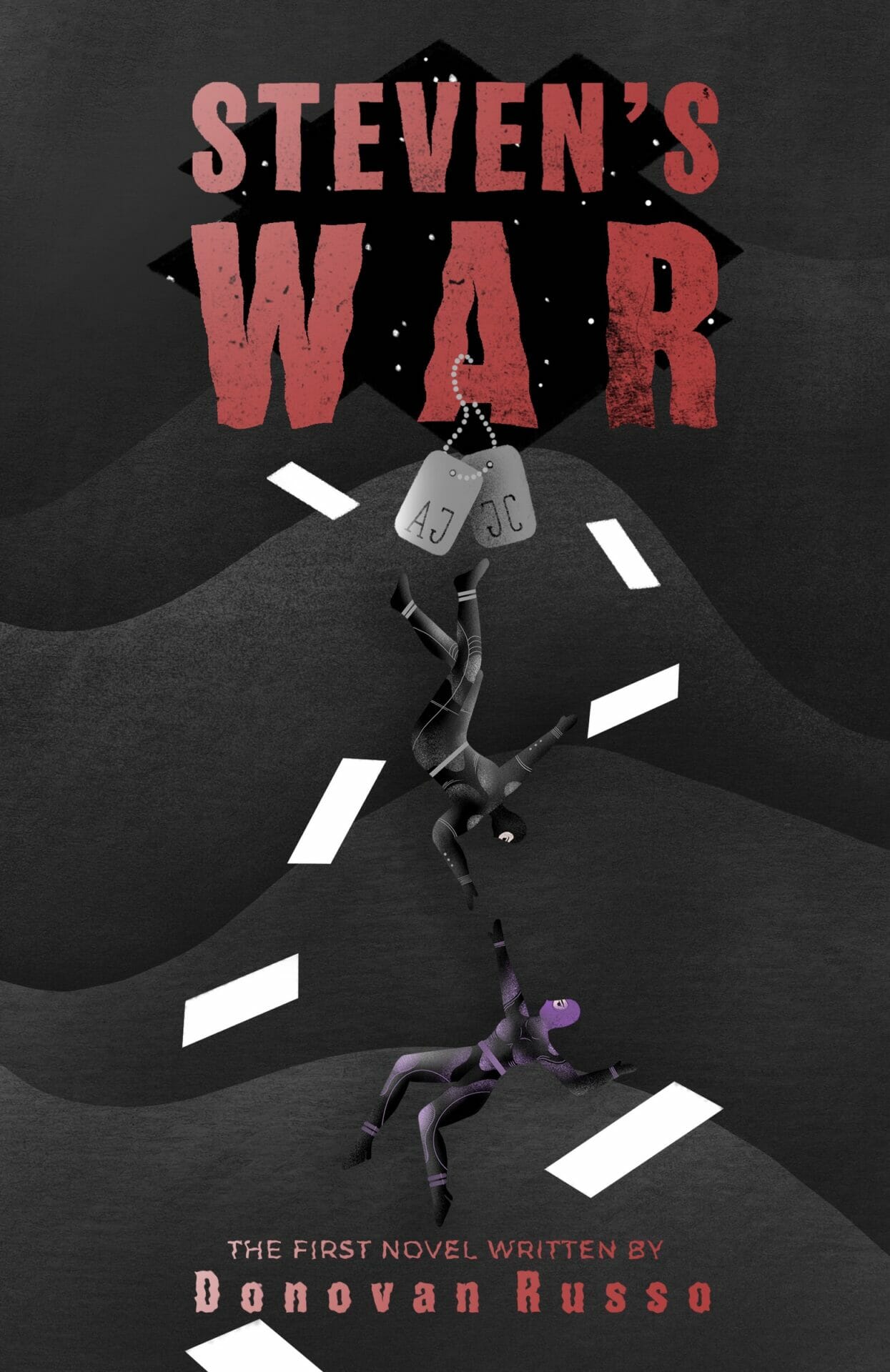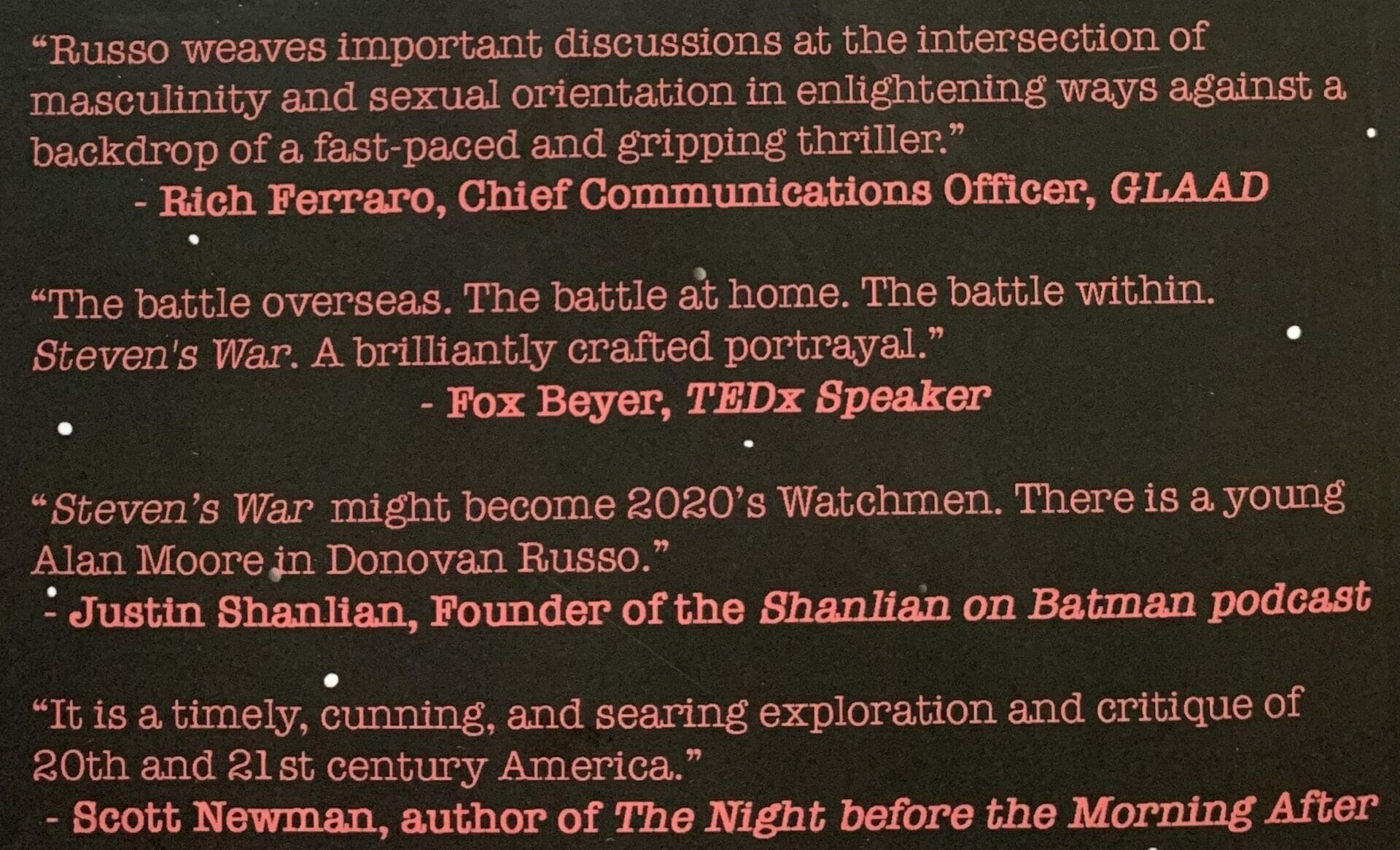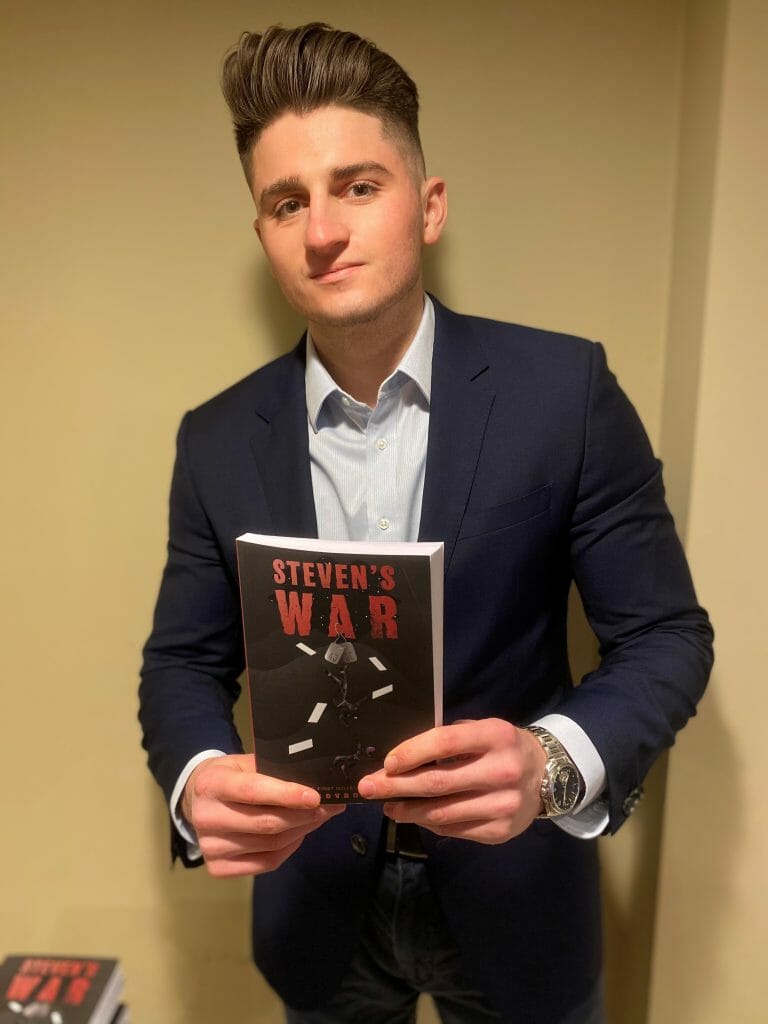LGBTQ people and issues were missing from the superhero and vigilante books that author and college student Donovan Russo read growing up and now his own talented writing is changing that. His first novel, Steven’s War, is not only a gripping and highly entertaining story, but brings inclusion to a genre where LGBTQ people and issues have been largely invisible.
Steven’s War was recently released by New Degree Press and is available on Amazon and Bookshop.org. Russo plans to donate part of the novel’s sales to GLAAD and the New Jersey LGBT Chamber of Commerce.
Steven’s War tells the story of Steven Cahill, a closeted Marine serving in Bagram, Afghanistan in 2009, during the ‘Don’t Ask, Don’t Tell’ period of the military; when LGBTQ service members were barred from the military and risked being discharged for coming out. After enduring a devastating loss on the battlefield, Steven is sent back home to the crime-ridden Salem City. When Steven’s world further crumbles, he embarks on a vengeful quest to take down the man responsible for Salem’s corruption. (Note: Like many works of fiction centering vigilantes, Steven’s War includes graphic descriptions of violence.)
The novel is a dark thriller which smartly and uniquely weaves in LGBTQ themes. In fact, Russo opens his novel with a Harvey Milk quote: “Hope is being able to see that there is light despite all of the darkness.”

The Bay Area Reporter, a leading LGBTQ media outlet, had high praise for Steven’s War:
“As a unique hybrid of human superhero and LGBTQ fiction, the novel is more than just a classic ‘good versus evil’ story, it also incorporates themes of identity, belonging, coming out, masculinity, and the reinforcement of that life-affirming fight against injustice in all its myriad forms.”
GLAAD Chief Communications Officer Rich Ferraro said: “This crime drama smartly fills a void in the genre by incorporating an unexpectedly humanizing and poignant account of a young man battling both internal and external demons. Russo weaves important discussions at the intersection of masculinity and sexual orientation in enlightening ways against a backdrop of a fast-paced and gripping thriller.”
Steven’s War author Donovan Russo is also a talented journalist and filmmaker who is pursuing his MBA at Seton Hall University. He has written for CNBC and Yahoo! Finance, covering an array of subjects, including comic book blockbusters and LGBTQ inequality.
When discussing his goals for Steven’s War, Russo said, “I grew up a huge fan of different comic book genres and characters but did not see enough LGBTQ vigilantes or these kinds of stories told. All readers deserve to see themselves represented and I wanted to write Steven’s War because the LGBTQ community has been largely neglected within the media. Steven Cahill’s struggles with his identity provides some LGBTQ readers with a relatable narrative, but I also hope Steven helps redefine how the literary world approaches inclusion when it comes to vigilante novels. Truly, I wanted to help diversify this genre. I really hope that readers will look at Steven Cahill as someone who they could identify with and that this novel could help redefine how we look at vigilante characters. Because we all deserve to be heard and we all deserve to see ourselves in the stories we consume.”
Russo secured funding for Steven’s War via Indiegogo. Prior to publishing Steven’s War, Russo spoke out about LGBTQ inclusion in crime dramas and the superhero genre:
Russo answers questions from GLAAD about Steven’s War below and you can read his full novel here.
Why did you want to write Steven’s War?
I have loved the comic book genre since I was a young boy. I specifically remember seeing Sam Raimi’s “Spider-Man” when I was in kindergarten and just being blown away by it. Truly, the comic book community is full of incredible people and I just wanted to add my spin to its incredible legacy of storytelling.
How come you wrote Steven as a gay man?
There are a couple of reasons why I wanted to write Steven Cahill this way. First off, it is no secret that we have seen a lack of LGBTQ representation across various forms of media for some time now. So, and while there obviously are other LGBTQ comic book characters, I wanted to try and do my part, creating more diversity and representation within the genre. Plus, I think that because the genre is so oversaturated, this was an opportunity for me to try and write something that we haven’t really seen before. Undoubtedly, the very core of this story focuses on Steven’s battle from within, embracing not only his sexuality, but his individuality.
We rarely hear about what it was like to be a LGBTQ active service member during ‘Don’t Ask, Don’t Tell.’ Did you do research into the policy as you wrote about Steven’s experiences in the Marines?
Yes, I read a lot of articles and watched a lot of videos on what it was like for actual soldiers. But part of it was just really diving deep down into the character and trying to really imagine what it would be like for this individual, who loves his country so much that he is willing to die for it, yet that love doesn’t necessarily go both ways. With that being said, I just thought that exploring the relationship between Steven and his country was such a sad, but important detail of this narrative. Moreover, this relationship and this policy plays a huge part in the metamorphosis of Steven’s demons and inner conflicts. Overall, I just thought it was important to show the impact that “Don’t Ask, Don’t Tell” had on this young man, who desperately tries to find love and acceptance throughout the book.
What is the most surprising aspect of Steven’s War?
You do not have to be a comic book lover to enjoy this story. I mean, yes, the book consists of your typical comic book-action sequences. But I also think that this is a real character driven story about a man trying to figure out his life. More than anything else, I think that took precedence while writing. Also, and not to toot my own horn, I think Steven’s War is actually really fun, as well! In fact, I’ll go as far as labeling it a Dramedy!

Are there any movies or comic book characters that inspired this book?
Of course! For one, this book is broken into three parts. So, I think Part One is mostly inspired from “Joker,” as I really dive in and try to explain why Steven embraces this crime fighting lifestyle. Part Two gets its inspiration from “Captain America: The Winter Soldier,” as we meet the sardonic Vanessa Giordano, who is hired by the notorious Paine brothers to kidnap Steven. And Part Three makes me think of “The Dark Knight Rises” because it focuses largely on redemption.
What is the key take away from the novel?
In the words of Oasis, “Don’t look back in anger.” Other than that, I’d say I also try to get across themes of gratitude, empathy and perseverance. But perhaps, in all honesty, you’re just going to have to read the book! That’s the great thing about art, there could be a million responses and interpretations to your work. And I am fine with that– the more the merrier.
You’ve spoken about heteronormativity and toxic masculinity while promoting Steven’s War. Can you explain how you addressed these topics while writing?
I try to parody subjects like masculinity in humorous ways throughout the book. But the truth is, I think I make fun of a lot of different personality types in Steven’s War, because I want to show just how ridiculous we can all be towards each other! In chapter three, Steven’s inner voice makes fun of the enchanted tales of womanizing his peers brag about while serving in war. And in chapter fifteen, Vanessa proves to her sexist male counterparts that women can be just as empowering and impactful, if not more!
You also stressed that you wanted to destigmatize LGBTQ stereotypes. What was your goal?
I wanted to show that Steven’s sexuality has nothing to do with how intimidating or capable he is as a crimefighter. And that, like other notable vigilante characters like Batman, Daredevil and the Punisher, Steven Cahill is not a force to be reckoned with. Also, I really tried to make it a point that this book is not politically motivated. I mean, yes, it does critique the former ‘Don’t Ask Don’t Tell’ policy, but Steven’s story really is about this guy trying to figure out his life, and regardless of what your sexual orientation is, I really do think Steven is a relatable character.
What are you working on besides Steven’s War and writing?
I’m currently finishing up my MBA at Seton Hall University. I love to write, play piano and work out. I have interned with NBCUniversal (4 times!), Verizon Media, The Walt Disney Company and Zero Gravity Management. I have also written at the national level for CNBC and Yahoo Finance, mostly focusing on entertainment, entrepreneurism and LGBTQ advocacy. And I am currently overseeing the launch of an inaugural film festival with the NJ LGBT Chamber of Commerce.
Will we see a sequel to Steven’s War?
I have some ideas circulating. But that book probably–if ever– won’t be written for a few years, as I have some other projects in the pipeline… But wouldn’t it be cool if Steven’s War became a miniseries or something?!
Steven’s War was recently released by New Degree Press and is available on Amazon and Bookshop.org. Check out the trailer below:













